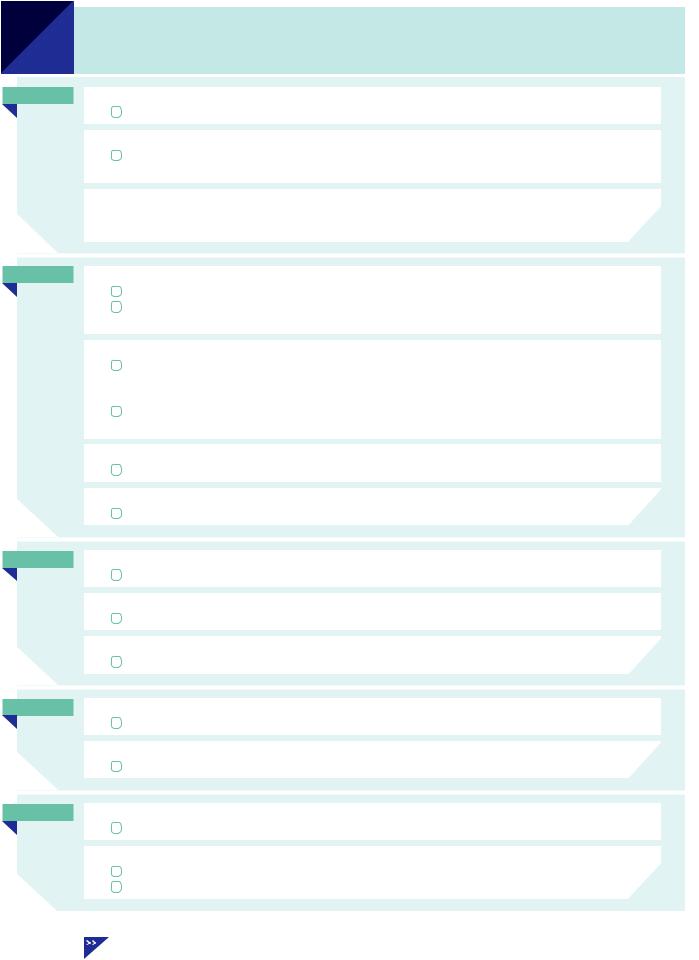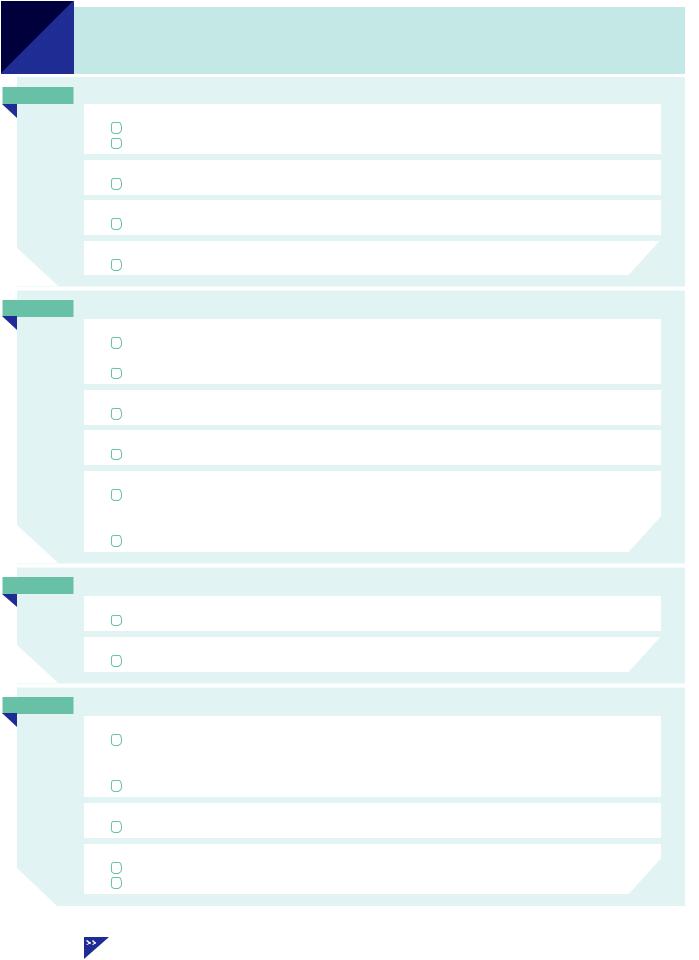
- •Contents
- •Thanks
- •To the student
- •To the teacher
- •3 Present continuous and present simple 1 (I am doing and I do)
- •10 Present perfect continuous and simple (I have been doing and I have done)
- •11 how long have you (been) … ?
- •12 for and since when … ? and how long … ?
- •13 Present perfect and past 1 (I have done and I did)
- •14 Present perfect and past 2 (I have done and I did)
- •15 Past perfect (I had done)
- •16 Past perfect continuous (I had been doing)
- •17 have and have got
- •18 used to (do)
- •19 Present tenses (I am doing / I do) for the future
- •20 I’m going to (do)
- •21 will and shall 1
- •22 will and shall 2
- •23 I will and I’m going to
- •24 will be doing and will have done
- •26 can, could and (be) able to
- •27 could (do) and could have (done)
- •28 must and can’t
- •29 may and might 1
- •30 may and might 2
- •31 have to and must
- •32 must mustn’t needn’t
- •33 should 1
- •34 should 2
- •35 I’d better … it’s time …
- •36 would
- •39 if I knew … I wish I knew …
- •40 if I had known … I wish I had known …
- •41 wish
- •42 Passive 1 (is done / was done)
- •43 Passive 2 (be done / been done / being done)
- •44 Passive 3
- •45 it is said that … he is said to … he is supposed to …
- •46 have something done
- •47 Reported speech 1 (he said that …)
- •48 Reported speech 2
- •49 Questions 1
- •52 Question tags (do you? isn’t it? etc.)
- •53 Verb + -ing (enjoy doing / stop doing etc.)
- •54 Verb + to … (decide to … / forget to … etc.)
- •55 Verb (+ object) + to … (I want you to …)
- •56 Verb + -ing or to … 1 (remember, regret etc.)
- •57 Verb + -ing or to … 2 (try, need, help)
- •58 Verb + -ing or to … 3 (like / would like etc.)
- •59 prefer and would rather
- •60 Preposition (in/for/about etc.) + -ing
- •61 be/get used to … (I’m used to …)
- •63 there’s no point in -ing, it’s worth -ing etc.
- •64 to … , for … and so that …
- •65 Adjective + to …
- •66 to … (afraid to do) and preposition + -ing (afraid of -ing)
- •67 see somebody do and see somebody doing
- •68 -ing clauses (He hurt his knee playing football.)
- •69 Countable and uncountable 1
- •70 Countable and uncountable 2
- •71 Countable nouns with a/an and some
- •74 the 2 (school / the school etc.)
- •75 the 3 (children / the children)
- •77 Names with and without the 1
- •78 Names with and without the 2
- •79 Singular and plural
- •80 Noun + noun (a bus driver / a headache)
- •81 -’s (your sister’s name) and of … (the name of the book)
- •82 myself/yourself/themselves etc.
- •83 a friend of mine my own house on my own / by myself
- •84 there … and it …
- •85 some and any
- •87 much, many, little, few, a lot, plenty
- •90 all every whole
- •91 each and every
- •92 Relative clauses 1: clauses with who/that/which
- •94 Relative clauses 3: whose/whom/where
- •95 Relative clauses 4: extra information clauses (1)
- •96 Relative clauses 5: extra information clauses (2)
- •97 -ing and -ed clauses (the woman talking to Tom, the boy injured in the accident)
- •98 Adjectives ending in -ing and -ed (boring/bored etc.)
- •99 Adjectives: a nice new house, you look tired
- •100 Adjectives and adverbs 1 (quick/quickly)
- •102 so and such
- •104 quite, pretty, rather and fairly
- •105 Comparative 1 (cheaper, more expensive etc.)
- •106 Comparative 2 (much better / any better etc.)
- •107 Comparative 3 (as … as / than)
- •108 Superlative (the longest / the most enjoyable etc.)
- •109 Word order 1: verb + object; place and time
- •110 Word order 2: adverbs with the verb
- •111 still any more yet already
- •112 even
- •114 in case
- •116 as (as I walked … / as I was … etc.)
- •117 like and as
- •119 during for while
- •121 at/on/in (time)
- •122 on time and in time at the end and in the end
- •123 in/at/on (position) 1
- •124 in/at/on (position) 2
- •125 in/at/on (position) 3
- •126 to, at, in and into
- •127 in/on/at (other uses)
- •129 Noun + preposition (reason for, cause of etc.)
- •130 Adjective + preposition 1
- •131 Adjective + preposition 2
- •132 Verb + preposition 1 to and at
- •134 Verb + preposition 3 about and of
- •135 Verb + preposition 4 of/for/from/on
- •136 Verb + preposition 5 in/into/with/to/on
- •137 Phrasal verbs 1 Introduction
- •138 Phrasal verbs 2 in/out
- •139 Phrasal verbs 3 out
- •142 Phrasal verbs 6 up/down
- •143 Phrasal verbs 7 up (1)
- •144 Phrasal verbs 8 up (2)
- •145 Phrasal verbs 9 away/back
- •Additional exercises
- •Study guide
- •Key to Exercises
- •Key to Additional exercises (see page 302)
- •Key to Study guide
- •Index

Unit
134 Verb + preposition 3 about and of
Ahear ABOUT … = be told about something
Did you hear about the fire at the hotel?
hear OF … = know that somebody/something exists
a: Who is Tom Hart?
B: I have no idea. I’ve never heard of him. (not heard from him)
hear FROM … = be in contact with somebody  a: Have you heard from Jane recently? B: Yes, she called me a few days ago.
a: Have you heard from Jane recently? B: Yes, she called me a few days ago.
Bthink ABOUT something = consider it, concentrate your mind on it:
I’ve thought about what you said and I’ve decided to take your advice. a: Will you lend me the money?
B: I’ll think about it. (not think of it)
think OF something = produce an idea:
It was my idea. I thought of it first. (not thought about it)
 I felt embarrassed. I couldn’t think of anything to say. (not think about anything) We also use think of when we ask for or give an opinion:
I felt embarrassed. I couldn’t think of anything to say. (not think about anything) We also use think of when we ask for or give an opinion:
a: What did you think of the movie?
B: I didn’t think much of it. (= I didn’t like it much)
Sometimes the diference is very small and you can use of or about:
When I’m alone, I oten think of you. or … think about you.
You can say think of or think about doing something (for possible future actions): My sister is thinking of going to Canada. or … thinking about going …
Cdream ABOUT … (when you are asleep)
I dreamt about you last night.
dream OF/ABOUT being something / doing something = imagine
Do you dream of being rich and famous? or … dream about being rich …
I wouldn’t dream OF doing something = I would never do it
‘Don’t tell anyone what I said.’ ‘No, I wouldn’t dream of it.’
Dcomplain (TO somebody) ABOUT … = say that you are not satisfied
We complained to the manager of the restaurant about the food.
complain OF a pain, an illness etc. = say that you have a pain etc.
We called the doctor because George was complaining of a pain in his stomach.
Eremind somebody ABOUT … = tell somebody not to forget
It’s good you reminded me about the meeting. I’d completely forgotten about it.
remind somebody OF … = cause somebody to remember
This house reminds me of the one I lived in when I was a child. Look at this photograph of Richard. Who does he remind you of?
268 |
remind somebody to … Unit 55B |

Exercises
134.1 Complete the sentences using hear or heard + a preposition (about/of/from).
1 |
I’m surprised you haven’t |
heard of her. She’s quite famous. |
|
2 |
‘Did you |
the accident last night?’ ‘No, what happened?’ |
|
3 |
Sarah used to call me quite oten, but I haven’t |
her for a long time now. |
|
4 |
‘Have you |
William Hudson?’ |
‘No. Who is he?’ |
5 |
Thanks for your email. It was good to |
you. |
|
6 |
‘Do you want to |
our trip?’ ‘Not now. Tell me later.’ |
|
7 |
I live in a very small town. You’ve probably never |
it. |
|
Unit
134
134.2Complete the sentences using think about or think of. Sometimes both about and of are possible. Use the correct form of think (think/thinking/thought).
1 |
I’ve thought about |
what you said and I’ve decided to take your advice. |
|
|
2 |
I need time to make decisions. I like to |
things carefully. |
||
3 |
You look serious. What are you |
? |
|
|
4 |
That’s a good idea. Why didn’t I |
that? |
|
|
5 |
I don’t really want to meet Tom tonight. I’ll have to |
an excuse. |
||
6 |
I’m |
buying a new car. What would you advise me to buy? |
||
7 |
When I was ofered the job, I didn’t accept immediately. I went away and |
it |
||
|
for a while. In the end I decided to take the job. |
|
||
8 |
a: I’ve just finished reading the book you lent me. |
|
||
|
B: What did you |
|
it? Did you like it? |
|
9 |
a: Will you be able to help me? |
|
|
|
|
B: I’m not sure. I’ll |
|
it. |
|
10 |
I don’t |
much |
this cofee. It’s like water. |
|
11 |
Katherine is homesick. She’s always |
her family back home. |
||
12 |
a: Do you think I should apply to do the course? |
|
||
|
B: I can’t |
any reason why not. |
|
|
134.3 Put in the correct preposition.
1 |
Did you hear about |
the fire at the hotel yesterday? |
|
|
||
2 |
I love living here. I wouldn’t dream |
|
going anywhere else. |
|
|
|
3 |
a: I had a strange dream last night. |
|
|
|
|
|
|
B: Did you? What did you dream |
|
? |
|
|
|
4 |
I love this music. It reminds me |
|
a warm day in spring. |
|
|
|
5 |
a: We’ve got no money. What are we going to do? |
|
|
|||
|
B: Don’t worry. I’ll think |
something. |
|
|
||
6 |
Our neighbours complained |
us |
the noise we made. |
|
|
|
7 |
Paul was complaining |
pains in his chest, so he went to the doctor. |
|
|||
8 |
He loves his job. He thinks |
it all the time, he dreams |
it, he talks |
it |
||
|
and I’m fed up with hearing |
it. |
|
|
|
|
134.4 Complete the sentences using these verbs (in the correct form) + a preposition:
|
complain |
dream |
hear |
remind |
remind |
think |
think |
|
1 |
It was my idea. I thought of |
it first. |
|
|
|
|
||
2 |
Ben is never satisfied. He’s always |
|
something. |
|
||||
3 |
I can’t make a decision yet. I need time to |
|
|
your proposal. |
||||
4 |
He’s not a well-known singer. Not many people have |
|
|
him. |
||||
5 |
a: You wouldn’t go away without telling me, would you? |
|
|
|
||||
|
B: Of course not. I wouldn’t |
|
|
it. |
|
|
||
6 |
I would have forgotten my appointment if you hadn’t |
|
me |
it. |
||||
7 |
Do you see that man over there? Does he |
|
you |
anybody you know? |
||||
Additional exercise 36 (page 323) |
269 |

Unit
135 Verb + preposition 4 of/for/from/on
Averb + of
accuse / suspect somebody OF …
Tina accused me of being selfish.
Some students were suspected of cheating in the exam.
approve / disapprove OF …
His parents don’t approve of what he does, but they can’t stop him.
die OF or die FROM an illness etc.
‘What did he die of?’ ‘A heart attack.’
consist OF …
We had an enormous meal. It consisted of seven courses.
Bverb + for
pay (somebody) FOR …
We didn’t have enough money to pay for the meal. (not pay the meal)
But we say ‘pay a bill / a fine / a fee / tax / rent / a sum of money’ etc. (no preposition) We didn’t have enough money to pay the rent.
thank / forgive somebody FOR …
I’ll never forgive them for what they did.
apologise (TO somebody) FOR …
When I realised I was wrong, I apologised (to them) for my mistake.
blame somebody/something FOR … , somebody is to blame FOR …
Everybody blamed me for the accident.
 Everybody said that I was to blame for the accident. blame (a problem etc.) ON …
Everybody said that I was to blame for the accident. blame (a problem etc.) ON …
It wasn’t my fault. Don’t blame it on me.
Cverb + from
sufer FROM an illness etc.
There’s been an increase in the number of people sufering from heart disease.
protect somebody/something FROM …
Sun cream protects the skin from the sun.
Dverb + on
depend ON … , rely ON …
I don’t know what time we’ll arrive. It depends on the trafic.
 You can rely on Anna. She always keeps her promises. You can use depend + when/where/how etc. with or without on:
You can rely on Anna. She always keeps her promises. You can use depend + when/where/how etc. with or without on:
‘Are you going to buy it?’ ‘It depends how much it is.’ (or ‘It depends on how much …’)
live ON money/food
Michael’s salary is very low. It isn’t enough to live on.
congratulate / compliment somebody ON …
I congratulated her on doing so well in her exams.
The meal was really good. I complimented Mark on his cooking skills.
270 |
Verb + preposition + -ing Unit 62 Other verbs + for Unit 133 Other verbs + on Unit 136E |

Exercises |
Unit |
135 |
|
|
|
135.1 Put in the correct preposition. If no preposition is necessary, leave the space empty.
1 |
Some students were suspected |
of cheating in the exam. |
||
2 |
Are you going to apologise |
what you did? |
|
|
3 |
The apartment consists |
three rooms, a kitchen and bathroom. |
||
4 |
I was accused |
lying, but I was telling the truth. |
||
5 |
We finished our meal, paid |
the bill, and let the restaurant. |
||
6 |
The accident was my fault, so I had to pay |
the repairs. |
||
7 |
Some people are dying |
hunger, while others eat too much. |
||
8 |
I called Helen to thank her |
the present she sent me. |
||
9 |
The government is popular. Most people approve |
its policies. |
||
10 |
Do you blame the government |
our economic problems? |
||
11 |
When something goes wrong, you always blame it |
other people. |
||
12 |
Forgive me |
interrupting, but I’d like to ask you something. |
||
135.2 Complete the second sentence so that it means the same as the first.
1 |
Sue said that I was selfish. |
|
|
||||
|
|
Sue accused me |
of |
being selfish |
. |
||
2 |
The misunderstanding was my fault, so I apologised. |
|
|||||
|
|
I apologised |
|
|
|
|
. |
3 |
Jane won the tournament, so I congratulated her. |
|
|||||
|
|
I congratulated |
|
|
|
|
. |
4 |
He has enemies, and he has a bodyguard to protect him. |
||||||
|
|
He has a bodyguard to protect |
|
. |
|||
5 |
Sandra eats only bread and eggs. |
|
|
||||
|
|
Sandra lives |
|
|
|
|
. |
6 |
You can’t say that the bad weather is my fault. |
|
|||||
|
|
You can’t blame |
|
|
|
|
. |
7 |
The police thought my friend had stolen a car. |
|
|||||
|
|
The police suspected |
|
|
|
. |
|
|
|
|
|||||
135.3 |
Complete the sentences using these verbs (in the correct form) + a preposition: |
||||||
|
|
accuse apologise |
|
approve |
congratulate |
depend live pay sufer |
|
1 |
His parents don’t |
approve of |
what he does, but they can’t stop him. |
||||
2 |
When you went to the theatre with Paul, who |
the tickets? |
|||||
3 |
It’s not pleasant when you are |
|
something you didn’t do. |
||||
4 |
We hope to go to the beach tomorrow, but it |
the weather. |
|||||
5 |
Things are cheap there. You can |
|
very little money. |
||||
6 |
You were rude to Lisa. I think you should |
her. |
|||||
7 |
Alex |
|
|
|
back pain. He spends too much time working at his desk. |
||
8 |
I called Jack to |
|
|
|
him |
passing his driving test. |
|
135.4 Put in the correct preposition. If no preposition is necessary, leave the space empty.
1 |
I’ll never forgive them for what they did. |
|
||
2 |
Vaccinations may protect you |
a number of diseases. |
||
3 |
You know you can always rely |
me if you need any help. |
||
4 |
Sophie will have to borrow money to pay |
her college fees. |
||
5 |
She’s oten unwell. She sufers |
|
very bad headaches. |
|
6 |
I don’t know whether I’ll go out tonight. It depends |
how I feel. |
||
7 |
Anna doesn’t have a job. She depends |
her parents for money. |
||
8 |
My usual breakfast consists |
fruit, cereal and cofee. |
|
|
9 |
I complimented her |
her English. It was really good. |
|
|
Additional exercise 36 (page 323) |
271 |
